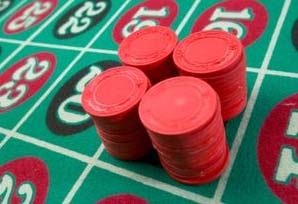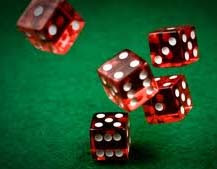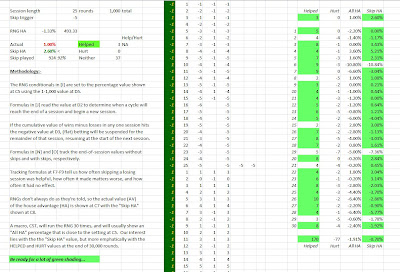_
(For updated information about Target's ongoing sports betting experiment, please go to the Sethbets website, or click here for an introduction to progressive betting, and here [20] and here [5] for current picks). You can also find a guide to the most basic Target strategy applied to more than 80,000 verifiable baccarat outcomes by visiting Google Docs.October was beginning to look like it was destined to become only the fourth "red" month since we started this transparent sports betting trial way back at the end of July, 2010.
But a one-goal win by the Toronto Maple Leafs on Saturday (the 29th!) pulled us smartly out of the hole, just as it was meant to, and we're now back on top and looking back at well over 4,000 bets and more than $2 million in total action.
What matters most is that against a persistent "bookies' edge" of 10%, we have managed to win (meaning
hold on to!) 8% of that enormous seven-figure churn.
The odds we have overcome are far greater than the house edge in casino table games, where roulette's 5.26% is about as punishing a HA as you're likely to encounter.
Blackjack is about a -1.0% proposition and baccarat is somewhere between -1.24% and -1.35% but I always believed that sports was an ideal proving ground for the Target method.
What's funny is that progressive betting as a concept is about as new-fangled as gambling itself. I can imagine cavemen rolling actual bones, and one of them thinking, "If I double my bet each time I lose, when I win I'll be back where I started."
The simple Martingale (-1, -2, -4, -8, -16, -32, +64) has great appeal from a speed and efficiency standpoint, but I believe that in the long run, it pushes bets way too high and can only prevail if there are no house limits in effect.
That's not how it is in the real world, so Target, with its bells and whistles now greatly streamlined, is simply a practical compromise.
Instead of one win we're looking for two ("twins"!), and that makes it a very easy strategy to learn.
In sports, I do play a "Marty" for a limited number of losses (I stole the nickname from a contributor to Baccarat Forums!) but the only two situations in which doubling the bet is critical, I believe, are after an opening loss, and after a first turnaround attempt in a recovery series goes down the tubes.
Sports is a bit more of a challenge than other games of chance because of the double-digit negative expectation percentage, so it's not quite as safe to assume that a "house" win is likely to be followed by a house loss, or vice versa.
Still and all, the principles are not much different, and the greatest advantage of sports betting is that it's safe to do it online.
"Virtual casinos" can
and do cheat when it comes to blackjack, baccarat and so on, but sports results are a matter of widespread public record, and stacking the deck is an impossibility.
So far, I'm very impressed with the efficiency of web-based sports books and the speed of their payouts.
The one thing to be leery of is the sign-up bonuses they offer: a 5x churn isn't unusual, and that means that if you accept a $300 bonus for a $1,500 buy-in, you won't be able to cash out one cent (not even a part of your original stake) until you have generated $9,000 in action.
The whole progressive betting advantage boils down to the Target mantra, winning more when you win than you lose when you lose.
Right now, the 20-line (almost) daily game chart stands at an average win of
$640 and an average loss of
$454.
That's a 41% W/L surplus, which alone accounts for us being almost $170,000 ahead after 15 months. That's $11,330 a month!
The 5-line parallel trial hasn't been running as long, but there we're looking at a 12.0% "bookies' edge" and a
51.0% W/L surplus.
Bookies the world over should be trembling in their boots, you might think.
But of course they're not.
For every steady winner there are at least a dozen reliable losers, and our success (even when we step up the action and move into the big leagues) is just a very small part of the cost of doing business for them.
So, what does our sports betting success have to do with the headline on this entry?
Good question, and the answer lies with the three weeks I have spent exploring the Baccarat Forums and learning a little more than I need to know about the philosophy of the average (losing) gambler.
Like most of these bulletin boards, BF tends to be monopolized by a noisy few, and I became one of those, putting up an average of almost five posts
a day as I sought to get across the perfectly logical - and provable - point that ultimately, only progressive betting can beat the game.
Two BF members in particular, whom I will refer to here as Bitter and Twisted to avoid heaping even more embarrassment on top of the damage they do to themselves with each new post, took exception to the very idea of Target.
They both claimed they couldn't get a handle on the idea that when you win more when you win than you lose when you lose, you end up with an average win value that exceeds your average loss value by a percentage substantially greater than the actual house edge.
(It's usual to refer to the house edge for a given recorded set of outcomes as the AV or actual value, and to use HA to describe the known house advantage for the game as a whole).
When I said - and proved - that in over 200,000 rounds of verifiable outcomes, all of them accessible online, Target delivered an AWB that beat the ALB by a minimum of 10%, what kept coming back was: "Tell me where there's a casino that pays 1.10:1 on winning Player bets!"
It was like being back in a schoolyard with a couple of bullies too dense to see sense and more intent on inflicting damage on others than on learning something that might just be helpful to them.
As I have said before, when you see irrational, spiteful behavior like that, you have to wonder what motivates it!
Both Bitter and Twisted have been posting on multiple gambling discussion groups for years, spending most of their time hurling insults at others while posing as baccarat savants, so the other topic of wonder is the quality of their sad little lives.
Most of the posts to BF have to do with how to make the right choice between baccarat's two main options, Banker and Player, and woe betide anyone who dares suggest that in the long run it really doesn't make any difference.
My position has always been that it's best to stick with Player only, primarily because there's no "5%" commission on winning bets.
The other factor has to do with the hazard of two options piled on top of the need to place the right bet - the right
amount - at the right time.
Having to deal with Which? as well as How much? doubles the danger that you're going to zig when the shoe or deck zags and vice versa - clearly it makes much more sense to pick a contender and stick with it through thick and thin.
I went to a lot of trouble to demonstrate that although the primary criticism of Target (or any form of progressive betting) is that it's "too risky," it in fact often requires less overall risk than betting methods that seem on the face of it to be more conservative or cautious.
Bitter and Twisted would have none of it, and their constant abusive and infantile responses in a setting which is supposed to encourage discussion and mutual support drowned out everyone else, and probably drove countless potential contributors away.
My biggest disappointment, I have to say, was with a guy who wisely finds better things to do with his time than log in to BF, but whose math skills make him the go-to guru for strategy analysis.
As I have said here before, he took just one of Target's rules - the LTD+ response to a mid-recovery win - and used that to "prove" that my progressive betting variation "failed" against more than a million shoes of baccarat.
I wouldn't take that much to heart but for the fact that "Imspirit" went further and said that Target was beaten by the Zumma baccarat sets and by the WOO 1,000, all of which were in truth soundly thrashed by the method, with detailed online proof provided.
Imspirit argues, in essence, that whatever the rules applied, progressive betting can never work in the long run, so why bother to test the method accurately?
He has one hilarious howler in his report about the tests, a chart that claims to show that both Banker and Player came out ahead in 1 million shoes with no house limits applied, and that
Banker did substantially better than Player using the one and only Target rule he selected.

It doesn't take a million-shoe trial to demonstrate what preposterous nonsense this is (although it was greeted with wild applause by the dummies on BF who fall for the house line that Banker is always the better bet at baccarat).
It cheers me no end, though, because it confirms that in spite of all the flash and pizazz that makes
Imspirit's blog a whole lot prettier than this one, the poor guy has his head wedged firmly up his bum!
When ALL of the Target rules were accurately applied, Player routinely topped Banker's win against the same outcomes for endless thousands of rounds - although both sides did very nicely, because that's what progressive betting does, folks.
I dedicated a recent
Sethbets page to demonstrating for Bitter's benefit that the so-called 5% commission will routinely hand Player more profit than Banker against the same sample of outcomes.
But I learned that in those circles (the rarefied forums where folks talk gambling every day but hardly ever actually do it, for the most part) anyone who challenges the conventional wisdom in any way quickly becomes a pariah.
Here's a math-based assessment of Imspirit's crazy chart above:

As for Imspirit, it's intriguing to discover that while taking a hard-line (but wholly uncorroborated) stance against progressive betting in any form, beating Target to a pulp with a million shoes without showing any actual bets, he's in fact
in thrall to methods of play that have zero basis in mathematics!
His impressive blog devotes page after page to tables and charts that would have boggled Einstein's mind, assessing, for example, the effect of the removal of certain cards from a baccarat shoe.
Truth is that unless all that hocus-pocus can tell us what's coming out of the shoe or deck
before we place a bet, it ain't worth a hill of beans.
Target, like any progressive betting method, doesn't pretend to predict: it
reacts.
We can never know ahead of the deal or spin or roll that we'll see the two wins in a row we hope for when a recovery opportunity arises. But we can always be certain that IF it happens (and it happens
a lot!) we'll have the right bet on the table at the right time.
The point I was making at the top of this essay is that there is no way to win without risk. Gambling is in its very essence a risky business. And the less you are willing to risk, the more likely you are to lose.
That's a mathematical fact. Cuts and burns and trends and biases, patterns and predictability, neutrals and opposites are not quantifiable or measurable, much as we'd like them to be.
There's just one thing Imspirit and I just might be able to agree on: intuition.
And since his mindless sims specifically banish intuition, along with every other human aspect of gambling, I have to wonder why he bothers.
An important reminder: The only person likely to make money out of this blog is you, Dear Reader. There's nothing to buy, ever, and your soul is safe (from me, at least). Test my ideas and use them or don't. It's up to you. One more piece of friendly advice: If you are inclined to use target betting with real money against online "casinos" such as Bodog, spend a few minutes and save a lot of money by reading this._



















